|


|

|
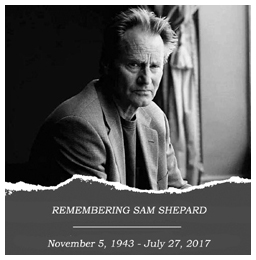
|
|
|
|
July 27, 2023 |
|
It's been six years since he left our world. His plays continue to be
staged and his films continue to be watched and folks continue to discuss who
exactly was Sam Shepard. Most likely his children knew him best but they're
going to keep their memories private. Scholars and writers are
still trying to analyze his works and his life. I came across another biography
this year, one written by veteran music journalist Robert Greenfield, who
doesn't appear to have any special connection to our playwright. In Ethan
Hawke's book review, he best summarizes my feelings - "The man remains
essentially inscrutable, as if we are cross-examining him from the distance of a
drone ó we learn where and when he went, but we have no idea why. And that is
probably the way Sam Shepard would have liked it."

Chicago journalist Nancy Bishop wrote, "Three other biographies of Shepard have
been published so one could argue that thereís no need for a fourth, although
Shepard is clearly an entrancing subject." Certainly, that's been the case for
me for the past 40 years - yes, an entrancing subject.
* * * * *
Last November Patti Smith published another book. It's called "A Book
of Days", a collection of 366 photos - some digital, some Polaroid, some old
and some new - one for each day of the year, accompanied by sparse text. In a
Vanity Fair interview, the punk icon was asked about her spread on the two Sam's
- Beckett and Shepard. She included one of Beckett's quotes - "I can't go on.
I'll go on." She explained:
I spent a lot of time with him at the end of his life
because he was suffering from ALS. He was always Sam. It never affected his
aptitude, his thought processes, but he was tremendously afflicted
physically. And so I just assisted him in any way I could, and sometimes it
was frustrating for him. Or sometimes it would take a long time to get
through a certain page because he couldn't write and wrote in longhand his
whole life. He never used a computer. He had to really go over everything in
his mind. At times, it would just get difficult. Either one of us would
evoke those words of Beckett. And Sam knew whole swatches of Beckett by
heart. Why it was funny was sometimes I'm sure he felt like he couldn't go
on and heíd say, "Patti Lee, I can't go on." And I'd look at him, almost
alarmed, and he'd say, "Iíll go on."

We
laughed a lot. And he was a really hard worker right to the end of his life. He
did love Beckett. In fact, when I first met him, I was readingÖ What was it? I
can't remember. But I was reading something by Beckett, and he was happy about
that. It was a common ground that we shared for 50 years.

That Polaroid I took of Sam, he was reading Beckett and I took that Polaroid,
and it's a really nice picture of Sam, I think, at his kitchen table.
* * * * * Last fall, filmmaker Treva
Wurmfeld, who directed the documentary,
SHEPARD & DARK, revisited that film's outtakes and published the
results in "Tangents: From the Making of Shepard & Dark". In the book's
introduction, she writes, "In these dialogues, Sam tells stories, talks about
his ideas, and references many interests including writing, theater, film,
family, Greek mythology, astrology, animal husbandry, women, mortality and
alcoholóall while on the road in New Mexico, Texas and Kentucky". She adds,
"Filming with Sam was complicated; even though my camera did its job of
capturing the present moment, no amount of filming could truly capture all the
layers at play that existed somewhere in the space between his work, his
character, me and the tension that comes from having head-to-head creative
agendas. At a certain point I had to ask the question, was he my subject or was
I his?"

Below is an edited excerpt of one of the "tangents" included in the book, where
Sam discusses the roots of his newfound appreciation for Sophocles and Greek
tragedy, which led to one of his final theatrical works, "A Particle of Dread:
Oedipus Variations."
I stayed away from Oedipus, stayed away from the Greeks
entirely for a long time, because I didnít think I was bright enough to get
it. I was intimidated by it. But finally my friend Joe Chaiken told me that
I should try it, just for the heck of it. So, I did, and I was kind of
stunned by how simple, how direct and to the bone it wasóthe language, the
ideas and the audacity of it, itís quite incredible.
Anyway, I thought for a long time I would try and adapt
it, but it didnít seem possible, because nobody knows what that religious
culture was like back then and it seemed stupid to try and imitate it. And
then to try and adapt it to a modern audience where everybody wears suits
and ties and dark glassesó[that] seems even more stupid, like the Blues
Brothers doing the Greeks, you know?
So, I gave up on it, actually, and then recently when I
was in Utah I started thinking about it again, and I came across this
translation by Robert Fitzgerald, whoís better known for his translations of
"The Iliad" and "The Odyssey". His translation of Sophoclesís whole trilogy
is astounding. So I started taking things out and putting them on the board
[looks up at whiteboard in office]. That top line comes from Antigone: "It
is the dead, not the living, that make the longest demands."
At the same time I was starting to write variations on it, I got a call from
my friend Stephen Rea in Ireland saying that he was putting back together
his theater company, Field Day, which evidently he had going in the í70s. It
broke up, and now heís putting it back together in Derry in the North. When
the Protestants took over Derry they called it Londonderry, and when the
Catholics took it over they called it Free Derry. Itís the last walled city
in Europe really, partitioned, you know, so I thought this would be a
perfect place to do variations on Oedipus. And then my
musician friend Bill Frisell came along and wanted to do music to it, so
everything started to fall into place. Weíre shooting for 2013, and now Iím
just kind of tracking it and traveling with it, using some of the original
characters and then some invented characters, but the themes and the
situations are all from the original.
   |
|
|
|
July 27, 2022 |
|
Today marks the 5th anniversary of Sam's death.
"I shall not look upon his like
again"
...Hamlet, Shakespeare
* * * * *
Next month AGES OF THE MOON
will be staged by Beth Kelly of New Jersey's Side of the Road Theater Company.
The play has two old men, who have been friends for 50 years, reassessing
their lives. Show times at the Milford Theater are August 13 and 20 at 7 p.m.
and Aug. 14 and 21 at 2 p.m. Kelly describes the play as "funny, beautiful, and
quirky" and "unique among Shepard's works for its touching story." Actor John
Klemeyer says, "It's a gorgeous piece of theater. If you only hone in on the sad
moments, you miss the point of the play. Shepard injects a level of
sophistication into these characters."
"Ages" premiered in 2009 at the Abbey Theatre in Dublin and
starred Stephen Rea and Sean McGinley.

The play
will also be performed in August by the Clifton Players, Cincinnati Artists
Theatre & Creative Asylum at Liberty Exhibition Hall. Show times are:
Fri-Sun, Aug. 5-7 at 7:30pm
Mon, Aug. 8 at 7:30pm
Fri-Sun, Aug. 12-14 at 7:30pm
Mon, Aug. 15 at 7:30pm
Fri-Sun, Aug. 19-21 at 7:30pm
Mon, Aug. 22 at 7:30pm |
|
|
|
July 4, 2022 |
|
Here are some interesting old photos from the UTSA digital
collection showing Sam and wife O-lan in their early theatre days.
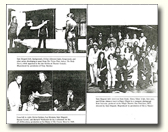 |
|
|
|
June 30, 2022 |
|
Upon Sam's death in 2017, film critic Brian Marks wrote the
following;
"In recent years, he
was best known as a reliable
supporting player, the go-to actor for noble lawmen, stubborn soldiers, and
bitter patriarchs. His skill on screen almost overshadowed the fact that his
career started behind the scenes and on the page. Shepard was the rare
playwright and actor, a category strangely uncommon in the history of
cinema."
"Sam Shepard was not a commercial figure Ė his plays were
done off-Broadway and his best work on screen is more recognized by
lovers of film than the average moviegoer."
I very much consider myself a passionate cinephile and I
absolutely agree with that last statement.
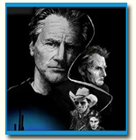 |
|
|
|
June 17, 2022 |
|
Plays to be staged this summer -
At London's Royal Academy of Dramatic Art - "Curse
of the Starving Class". From June 30 to July 9.
In Wellfleet, MA, the Harbor Stage Company offers "Buried
Child" from June 16 thru July 9.
In California, the San Jose Stage company will present "The
Tooth of Crime" from August 3 thru August 22. |
|
|
|
April 6, 2022 |
|
For those who wish to inquire about permission to use any of
Sam's works for future book publications or plays, you might try writing to this
address:
Knopf Doubleday,
1745 Broadway,
New York, NY 10019
|
|
|
|
February 18, 2022 |
|
In November Valarie Smith of the Oregon Artwatch
Organization posted an interview with author Willy Vlautin and together they
had some very perceptive opinions of our playwright.
Smith:
"Nobody I know reads Sam Shepard. Nobody... It
might be hard for women to relate to him. Also, his prose is deceptive ó
heís working on so many levels. And when you look at his body of work,
thatís what tells the story. I bought a biography of his, but I canít think
of a biography that Iím less interested in reading Ė itís already there, on
the pages of all his books."
"It seemed like it got worse for Shepard over the years,
like he became unmoored somehow... Iím reading a book of letters he
exchanged with Joseph Chaikin, a theater producer he worked with in the
early years. Even then, you can see the cracks: how he canít reconcile these
opposing sides of himself. I wonder if he was afraid to lose something
creatively if he tried to come to terms with it all."

Vlautin:
"You wonder with stuff like that, like his problems with
his dad. If you keep making a lot of mistakes throughout your life, maybe
you just keep leaning on that idea that it all started because of that. I
donít know if he kept that wound open so he could keep mining it, like it
was a wound that never healed, so he had to write about it."
"I think thereís a loneliness in [Shepardís writing] that
a lot of people have. Family doesnít bring him comfort, religion doesnít
give him comfort. Alcohol gives him comfort and then beats him on the side
of the head for getting comfort from it. And his past wonít ever let him go
or he wonít let it go."
|
|
January 7, 2022 |
|
On January 13 at 1:30 pm, Manhattan's MoMA will screen the
documentary ME AND MY BROTHER (1965-1968). Written by
director/cinematographer Robert Frank and Sam Shepard, this film shows the
relationship between Allen Ginsberg, Peter Orlovsky and Peter's brother Julius,
who was diagnosed with schizophrenia. This 4k digital restoration of the
original version was done by The Museum of Modern Art and this screening will
mark its North American premiere. It is a record of bohemian artist life in
1960s New York and was first featured at the 1968 Venice Film Festival.
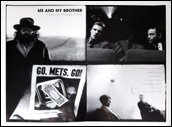 |
|
|
|
January 5, 2022 |
|
When "Travellin' Man" Bob Dylan began his Rolling Thunder
Revue tour (1975-76), he enlisted Sam to write a screenplay of the event. He
imagined his troop of artists, which included Joni Mitchell, Allen Ginsberg, Arlo Guthrie and Joan Baez, would create an on-the-road Kerouac-style story. The
task ended up being too difficult for Sam so the film never developed but his
log of the tour's experience was published a couple years later.
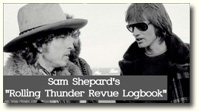
Among his impressions, Sam noted, "MYTH is a powerful medium
because it talks to the emotions and not to the head. It moves us into an area
of mystery. Some myths are poisonous to believe in, but others have the capacity
for changing something inside us, even if itís only for a minute or two. Dylan
creates a mythic atmosphere out of the land around us. The land we walk on every
day and never see until someone shows it to us."
Sam continues, "Dylan
has invented himself. Heís made himself up from scratch. That is, from the
things he had around him and inside him. Dylan is an invention of his own mind.
The point isnít to figure him out but to take him in. He gets into you anyway,
so why not just take him in? Heís not the first one to have invented himself,
but heís the first one to have invented Dylan."
Myth also became part of Sam's persona. Upon his death in
2017, the LA Times wrote, "Despite dozens
of blatantly personal plays to his name, movie stardom and the spotlight of
celebrity and acclaim, Shepard remained throughout his life an inscrutable
figure, an American myth in plain sight."
It has just come to my attention that on the back of the
Viking Press edition of the logbook is a photo taken by Johnny Dark, of Sam and
wife O-lan.
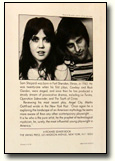 |
|
|
|
January 1, 2022 |
|
In the January 2022 issue of "True West" magazine,
Mark Broadman writes, "Sam Shepardís 1980 play True West is one of his
best known efforts. It examines the relationship of two brothers, previously
estranged, as they come to grips with their relationship through writing a
screenplay about the 'true West.' Shepard had to get the okay from True West
magazine to use that title for his play. It wasnít the first time that happened.
The 1965 album 'Johnny Cash Sings the Ballads of the True West' was reportedly
inspired by The Man in Blackís love of the publication."
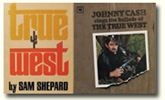
|
|
|
|
Previous News:
2021
July-December 2020
January-June 2020
July-December 2019
January-June 2019
July-December 2018
May/June 2018
April 2018
March 2018
February 2018
January 2018
December 2017
November 2017
October 2017
September 2017
July-August 31, 2017
January-June 2017
July-December 2016
January-June 2016
July-December 2015
January-June 2015
July-December 2014
January - June 2014
July-December 2013
January-June
2013
July-December 2012
January-June 2012
July-December 2011
January - June 2011
July - December 2010
January - June 2010
July - December 2009
January - June 2009
July - December 2008
January - June 2008
July-December 2007
January-June 2007
November 2005 - December 2006 |
|
|
|